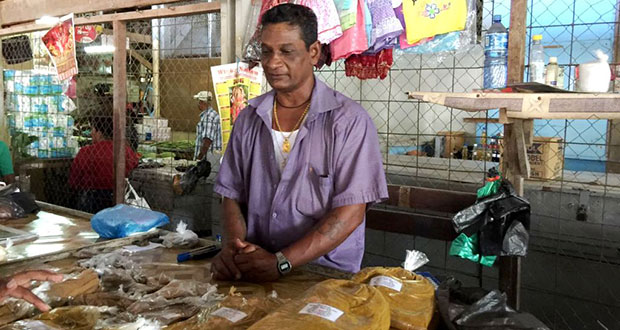
Guyanese feeling the ‘squeeze’ in Nickerie
…mull returning home as SRD slides
By Alva Solomon
AS THE Surinamese economy hangs in free-fall mode, Guyanese businesses in Nickerie are feeling the effects of the sliding Suriname Dollar (SRD) and persons are contemplating returning to these shores after several decades of being away.
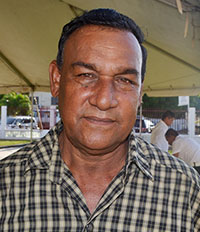
Deonarine Persaud, a pensioner who moved to Suriname from Berbice
Food and basic commodity prices in Suriname have climbed in recent months, and during a recent visit to the border district of Nickerie, in the western part of the Dutch-speaking Caricom country, most persons who spoke with this publication echoed similar sentiments: that business is slow, and some persons have closed their small commercial operations.
Last Saturday morning, businessman Ragoemani Munnsami stood over his stall of spices, which he has been marketing for years at the Nickerie Market. He said he migrated to the area more than three decade ago, looking for work. He changed jobs: from being a security guard to being a bodywork technician; and he even worked in the fishing industry before setting up his own business a dozen years ago.
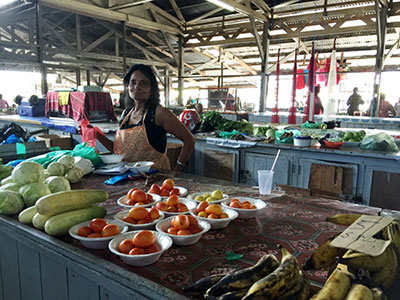
This Berbice–born vendor complained of the rising prices of commodities in Nickerie
As time progressed, he settled on vending at the Nickerie Market. His trade includes the purchasing of spices and herbs, including geera, Chinese spice, curry powder and black-pepper, among others. He pointed to a packet of masala which he sells for SRD$4 per 75-gram packet. A year ago the item was selling at SRD$2 for the same quantity. The prices of most other spices on his stand have been doubled in recent months.
Munnsami said he relocated to Suriname around 1990, when “things in Guyana (were) hard and we come over here and we find it easy.” He does not own a mill, hence he pays a private entity to grind his spices, which he retails at the market. These days, however, sales are not bringing the profits he would wish for. The former West Coast Demerara resident noted that while Guyana’s economy is set to take off, he cannot envisage relocating, since he has built his life in the Dutch-speaking nation.

A Guyanese vendor stands beside his stalls where he sells fruits and cash crops
His children are all grown, and are employed in the public sector in Nickerie.
Further down the row in the neatly–kept market, another Guyanese vendor complained about the prices of commodities such as rice being costly. While not giving her name, she explained that the unstable SRD has been affecting business, and the consumers have felt the effects. Things have become expensive in the shops, she said.
Having moved to Suriname in the early 1990s, she has also built her life there, and has raised her two daughters in Nickerie. Now in her 50s, she said, she is contemplating relocating to Berbice, where she resided originally, but that decision is one the family will have to discuss.
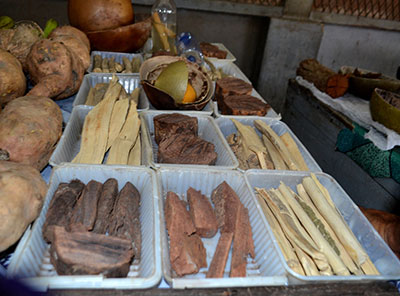
A variety of tree barks which are used as nutritional supplements are on sale at the Nickerie Market
“One kilo of rice was affordable at the time,” she said, as she recalled her early days in Suriname.
A walk around Nickerie would create an impression that the cost-of-living is not affecting persons, since most households own a car, and vehicles are being sold at affordable prices there.
But Deonarine Persaud, who moved to Suriname from Berbice on November 6th, 1990, noted that the SRD has been fluctuating over the past year, and this has had a direct effect on the economy. As a result, cost-of-living is increasingly becoming difficult for some.
“That is the thing that killing business now,” he said of the sliding SRD, noting that he is examining the situation carefully. “If it doesn’t change, I have my property in Guyana as well, so I can always go home,” he said in a matter–of-fact tone.
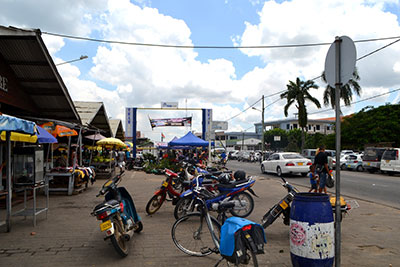
Several motorcycles parked outside the Nickerie Market
Persaud expressed optimism about the Guyanese economy as he listed the various sectors which he noted would catapult development here. “Oil in Guyana would be the boss,” he declared as he noted that if Guyana’s economy booms in the years ahead, he would definitely relocate to Bush Lot. “It’s no big thing to relocate,” he added.
Like many other persons who spoke to this publication, Persaud had moved to Suriname in search of greener pastures. He was, in fact, attempting to go beyond the Dutch-speaking nation, but relatives had persuaded him to stay in Suriname. He said his last job was that of a supervisor at an aviation company which was involved in crop-dusting. Since retiring, he said, he travels to Guyana frequently.
“I’m looking at things, and if it doesn’t get better, Guyana is always home,” he added.
There are an estimated 3,000 Guyanese residing in Nickerie, most of whom are employed in the fishing and banana industries, while others work in the rice sector.
Surinamese authorities have reported in a recent New York Times’ article that the current economic free-fall is temporary. Economy Minister Gillmore Hoefdraad told the New York Times that the economic crisis is temporary, and will improve when gold and oil prices recover. For the Guyanese population in Nickerie, the situation is being carefully analysed.
